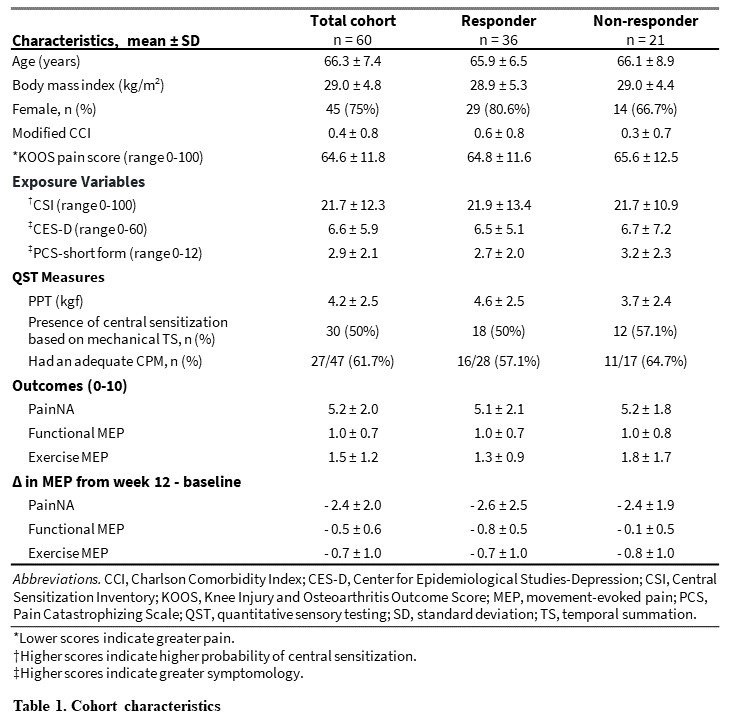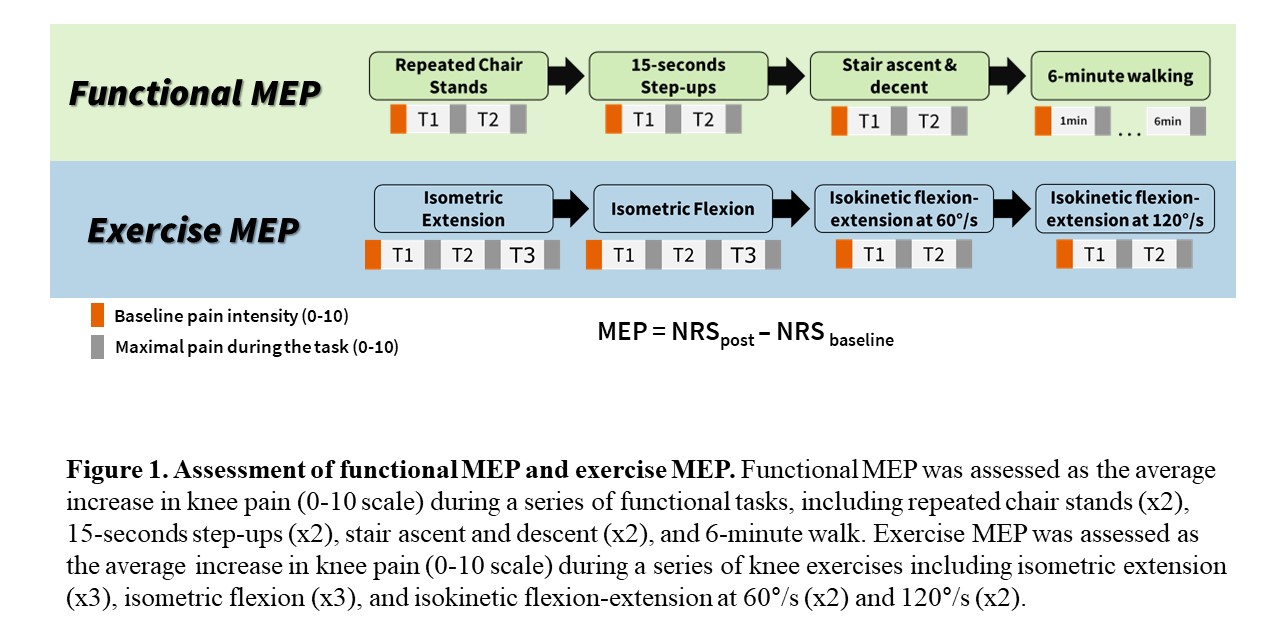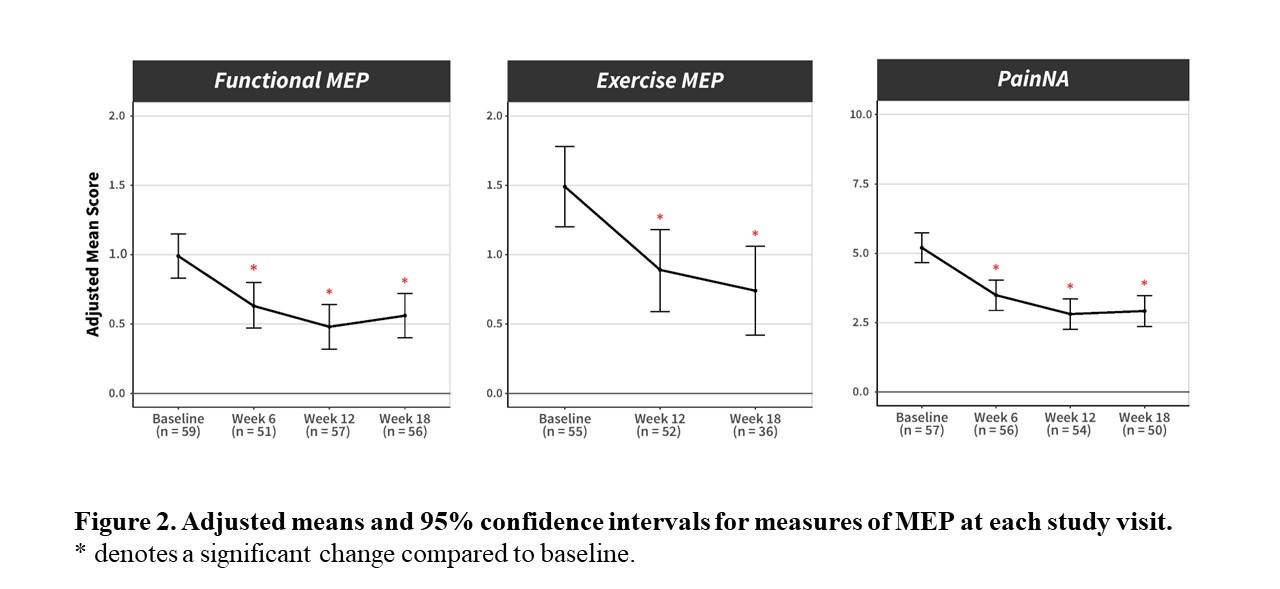Session Information
Session Type: Poster Session C
Session Time: 9:00AM-11:00AM
Background/Purpose: Movement-evoked pain (MEP), i.e., pain that appears with or is made worse by movement, is a common complaint in people with knee osteoarthritis (OA). MEP is more intense and bothersome than spontaneous pain and is related to greater disability. However, little is known about whether exercise, the first-line recommendation for managing chronic pain due to knee OA, can reduce MEP and factors that may predict treatment response. The objectives of this study were: (1) to investigate the effect of a 12-week exercise-based physical therapy intervention on MEP in people with knee OA and (2) to examine whether baseline psychological factors and nociceptive dysfunction predict change in MEP.
Methods: For this study, we used data from a single-arm clinical trial (#NCT04243096) of a 12-week exercise intervention in people with symptomatic knee OA (n = 60, Table 1) with age ≥ 50 and BMI ≤ 40 kg/m2. Participants received 18 sessions (8 via telehealth) of an exercise intervention with a physical therapist over 12 weeks. Our primary outcome was MEP during functional activities (functional MEP), and secondary outcomes included exercise MEP and knee pain during nominated activity (PainNA, 0-10 scale) (Figure 1). These outcomes were assessed at baseline, and weeks 6, 12, and 18. At baseline, nociceptive functioning was assessed using quantitative sensory testing that included pressure pain threshold (PPT), mechanical temporal summation (TS), and conditioned pain modulation (CPM). At baseline, participants also completed Center for Epidemiologic Studies Depression Scale (CES-D), Central Sensitization Inventory (CSI), and pain catastrophizing scale (PCS; 3-items). Responders were individuals with ≥ 50% improvement in functional MEP from baseline to week 12. The effect of an exercise intervention on MEP from baseline to follow-up was evaluated with mixed model repeated measures (MMRM) adjusting for age, sex, BMI, and presence of comorbidities. Log-binomial regression was used to determine whether any baseline measures predicted treatment response based on functional MEP while adjusting for sex and BMI.
Results: We observed a significant improvement in all MEP outcomes with exercise at week 6 and week 12 with the improvements being sustained at week 18 (Figure 2). In our cohort, 63.2% of participants met our definition of responders based on functional MEP. None of the baseline measures were predictive of treatment response based on functional MEP.
Conclusion: Participants with symptomatic knee OA undergoing a 12-week exercise intervention demonstrated reductions in MEP, supporting the use of exercise as a core treatment for this population. Given the lack of a control group, it is possible that regression to the mean or other factors may have contributed to observed improvements in MEP. While minimal important change for functional MEP and exercise MEP is not known, the improvements in PainNA at week 12 were clinically meaningful. The lack of associations between baseline psychological factors as well as measures of nociceptive function suggests that exercise may be an effective intervention for MEP, irrespective of alterations in these measures in people with knee OA.
To cite this abstract in AMA style:
Kim E, Neogi T, Senderling B, Gheller M, Marinko L, LaValley M, Adamowicz L, Georgiev P, Demanuele C, Wacnik P, Kumar D. Effects of Exercise on Movement-Evoked Pain in People with Knee Osteoarthritis [abstract]. Arthritis Rheumatol. 2023; 75 (suppl 9). https://acrabstracts.org/abstract/effects-of-exercise-on-movement-evoked-pain-in-people-with-knee-osteoarthritis/. Accessed .« Back to ACR Convergence 2023
ACR Meeting Abstracts - https://acrabstracts.org/abstract/effects-of-exercise-on-movement-evoked-pain-in-people-with-knee-osteoarthritis/



